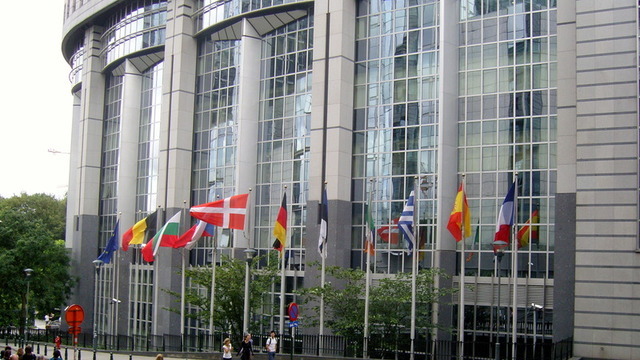
Last Thursday, the European Parliament adopted a resolution ahead of a forthcoming summit between Europe and the United States. It included a section on "the need to protect the integrity of the global Internet and freedom of communication by refraining from unilateral measures to revoke IP addresses or domain names."
That provision was added at the urging of the civil liberties organization European Digital Rights (EDRi). In a presentation to the Parliament's Civil Liberties Committee, EDRi's Joe McNamee noted that "the United States has, up until recently, never sought to exploit its theoretical jurisdiction over the companies and infrastructure that are at the core of the Internet."
Obviously, that is changing. The government has begun seizing domain names of so-called rogue sites. And the Stop Online Piracy Act (SOPA) would lead to even more aggressive copyright enforcement efforts. These tactics threaten to undermine US leadership of the Internet and could endanger the conensus-driven process that has served its development for so long. It could also harm US companies competing overseas.
Disproportionate influence
Because the Internet was originally developed in the United States with federal money, the US government enjoys disproportionate influence over Internet governance. The Internet Corporation for Assigned Names and Numbers (ICANN) is based in the United States, as are the majority of the DNS root servers and the registries for popular top-level domains like ".com" and ".org." While there has been regular grumbling about this dominance, the US government's relatively hands-off approach has served the Internet pretty well and has helped dissuade other nations from challenging the status quo (other governments have gained some modest additional power at ICANN).
But that's likely to change if the US government continues throwing its weight around. For example, we've covered the case of Rojadirecta, a site that had its .com domain seized by American officials despite the fact that its operations had been found legal by a Spanish court. Whatever short-run benefits this policy might have from an anti-piracy perspective, the long-run consequences are obvious: non-Americans will be more reluctant to register .com or .org websites. And eventually, foreign governments will object even more strongly to the US control of key DNS systems.
That backlash doesn't seem to have started in earnest yet. While the European parliament has been critical of US efforts to use its control over DNS to fight "rogue sites," McNamee says the European Commission, the EU's executive branch, has endorsed the American government's actions. He speculates that the EU government is hoping to set a precedent for European authorities to seize European IP addresses under similar circumstances. (Such plans for a "virtual Schengen border" have already leaked.)
Soft power
The controversy over DNS is just one example of the US government using its de facto control over key communications infrastructure to promote US policy objectives. For example, because the United States created the Internet, a disproportionate share of Internet traffic passes through the United States. Or at least it used to. Under the Bush administration, the National Security Administration realized that America's central position in the Internet backbone was an opportunity to intercept foreign communications. Of course, within a few years the existence of this program was revealed to the public, with predictable results: foreign nations became less willing to have their traffic flow through the United States.
Similarly, dozens of American software and telecommunications companies have thrown their weight behind the Digital Due Process Coalition because the lack of robust Fourth Amendment protections for online services makes it difficult for American companies to sell cloud-based services overseas. Foreign businesses are not interested in storing their sensitive documents in a country where the third party doctrine (once you store a document with a third party, you have given up much of your privacy protection) gives the government the power to rifle through electronic files with minimal judicial oversight.
America's position of influence over the Internet economy is a valuable form of "soft power." If the US government uses this power judiciously, it can ensure that the Internet evolves in ways that serve US interests.
Instead, American policymakers are rapidly squandering this soft power by giving US law enforcement agencies—and, under SOPA, even private copyright holders—free rein to exercise this power with minimal judicial oversight. The US is home to many of the world's leading search engines, advertising networks, and credit card payment networks. These firms not only serve the US market, they are also widely used overseas. If the US begins to use them as pawns in its war against file-sharing, foreigners and their governments will become more reluctant to rely on them.
This may serve some short-term political goals, but it's likely to produce ham-fisted behavior by law enforcement that will permanently damage our international reputation. Other countries will find it harder to trust the US. Instead, foreign countries will build their own competing communications infrastructure, and they'll demand that control over Internet governance be transferred to truly international institutions. In short, if America abuses its soft power, that power will evaporate.
Listing image by Tom Redford / Flickr
reader comments
65